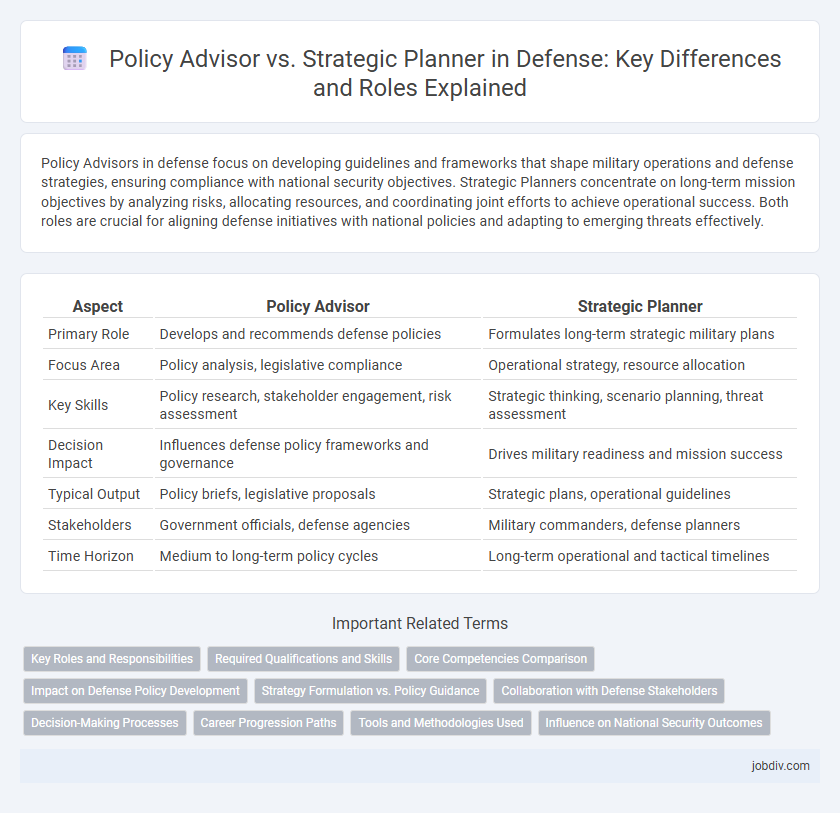Policy Advisors in defense focus on developing guidelines and frameworks that shape military operations and defense strategies, ensuring compliance with national security objectives. Strategic Planners concentrate on long-term mission objectives by analyzing risks, allocating resources, and coordinating joint efforts to achieve operational success. Both roles are crucial for aligning defense initiatives with national policies and adapting to emerging threats effectively.
Table of Comparison
| Aspect | Policy Advisor | Strategic Planner |
|---|---|---|
| Primary Role | Develops and recommends defense policies | Formulates long-term strategic military plans |
| Focus Area | Policy analysis, legislative compliance | Operational strategy, resource allocation |
| Key Skills | Policy research, stakeholder engagement, risk assessment | Strategic thinking, scenario planning, threat assessment |
| Decision Impact | Influences defense policy frameworks and governance | Drives military readiness and mission success |
| Typical Output | Policy briefs, legislative proposals | Strategic plans, operational guidelines |
| Stakeholders | Government officials, defense agencies | Military commanders, defense planners |
| Time Horizon | Medium to long-term policy cycles | Long-term operational and tactical timelines |
Key Roles and Responsibilities
Policy Advisors analyze defense regulations, develop governmental recommendations, and ensure alignment with national security objectives. Strategic Planners design long-term military strategies, assess threat environments, and allocate resources to optimize defense capabilities. Both roles require expertise in defense policies but differ as Policy Advisors emphasize policy formulation while Strategic Planners focus on operational implementation and strategic resource management.
Required Qualifications and Skills
Policy Advisors in defense require expertise in international relations, defense policy, and legislative processes, coupled with strong analytical and communication skills to influence decision-making. Strategic Planners must possess advanced knowledge of military strategy, risk assessment, and operational planning, alongside proficiency in data analysis, critical thinking, and leadership. Both roles demand security clearances and the ability to interpret complex intelligence while adapting to evolving geopolitical threats.
Core Competencies Comparison
Policy Advisors in defense focus on regulatory frameworks, government relations, and compliance with international law, ensuring strategic decisions align with political mandates. Strategic Planners excel in long-term threat assessment, resource allocation, and operational scenario development to optimize military readiness and effectiveness. Both roles demand critical thinking, communication skills, and an understanding of defense policy, but Policy Advisors emphasize policy formulation while Strategic Planners prioritize tactical execution and future force positioning.
Impact on Defense Policy Development
Policy advisors synthesize intelligence and geopolitical analyses to recommend actionable defense strategies, directly shaping legislative frameworks and resource allocations. Strategic planners design long-term operational frameworks and contingency plans that align military capabilities with national security objectives, ensuring preparedness and adaptability. Both roles influence defense policy development by integrating tactical insights and strategic visions that optimize defense posture and national security outcomes.
Strategy Formulation vs. Policy Guidance
Policy Advisors concentrate on providing expert policy guidance, ensuring defense strategies align with national security objectives and legislative frameworks. Strategic Planners focus on strategy formulation by developing comprehensive operational plans and long-term military objectives that address emerging threats and resource allocation. Both roles are critical in defense, with Policy Advisors emphasizing regulatory compliance and strategic direction, while Strategic Planners prioritize actionable, tactical execution plans.
Collaboration with Defense Stakeholders
Policy advisors in defense collaborate closely with military leaders, government officials, and intelligence agencies to align policies with national security objectives. Strategic planners work alongside defense contractors, operational commanders, and interagency partners to develop actionable plans that support military missions. Both roles require continuous engagement with defense stakeholders to ensure cohesive decision-making and effective implementation of defense strategies.
Decision-Making Processes
Policy advisors emphasize analyzing political, social, and economic factors to recommend actionable policies within defense frameworks, ensuring alignment with overarching government objectives. Strategic planners concentrate on long-term military goals, integrating intelligence assessments and resource allocation to formulate operational plans that guide defense force deployment. Both roles rely on data-driven decision-making processes, but policy advisors prioritize policy formulation, whereas strategic planners focus on executable military strategies.
Career Progression Paths
Policy Advisors in defense typically advance by gaining expertise in regulatory frameworks and interagency coordination, often moving into senior government or military advisory roles. Strategic Planners progress through operational command or joint staff positions, developing skills in resource allocation and mission planning, which can lead to leadership roles in defense strategy or program management. Both career paths require continuous professional development and security clearances, but Strategic Planners often transition to higher command responsibilities, whereas Policy Advisors influence defense policy formulation and implementation.
Tools and Methodologies Used
Policy Advisors in defense utilize analytical frameworks, stakeholder analysis tools, and policy simulation software to assess the implications of defense policies and recommend actionable strategies. Strategic Planners employ scenario planning methodologies, war-gaming software, and decision support systems to forecast operational outcomes and develop long-term military strategies. Both roles leverage geographic information systems (GIS) and data analytics platforms to enhance situational awareness and optimize defense capabilities.
Influence on National Security Outcomes
Policy advisors shape national security outcomes by providing expert recommendations that influence defense strategies and government decision-making processes. Strategic planners translate these policies into actionable long-term military operations and resource allocation to ensure national defense objectives are met. Their combined efforts drive the alignment of political directives with operational capabilities, directly impacting national security effectiveness.
Policy Advisor vs Strategic Planner Infographic

 jobdiv.com
jobdiv.com